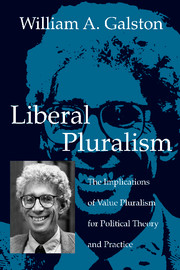Book contents
- Frontmatter
- Contents
- Acknowledgments
- LIBERAL PLURALISM
- I INTRODUCTION
- II FROM VALUE PLURALISM TO LIBERAL PLURALIST THEORY
- III THE PRACTICE OF LIBERAL PLURALISM
- 7 Democracy and Value Pluralism
- 8 Parents, Government, and Children: Authority over Education in the Liberal Pluralist State
- 9 Freedom of Association and Expressive Liberty
- 10 Liberal Pluralism and Civic Goods
- Index
9 - Freedom of Association and Expressive Liberty
Published online by Cambridge University Press: 20 March 2010
- Frontmatter
- Contents
- Acknowledgments
- LIBERAL PLURALISM
- I INTRODUCTION
- II FROM VALUE PLURALISM TO LIBERAL PLURALIST THEORY
- III THE PRACTICE OF LIBERAL PLURALISM
- 7 Democracy and Value Pluralism
- 8 Parents, Government, and Children: Authority over Education in the Liberal Pluralist State
- 9 Freedom of Association and Expressive Liberty
- 10 Liberal Pluralism and Civic Goods
- Index
Summary
THE LIBERAL PLURALIST STATE AND FREEDOM OF ASSOCIATION
A liberal pluralist state will contain numerous associations embodying very different conceptions of the ways in which human beings ought to relate to one another and of the goals they ought to pursue. This raises the issue of the proper relation between the state's general public principles and the particular principles that guide the diverse subcommunities. Before exploring this issue systematically, I want to reflect briefly on the reasons that it seems so pressing in the United States today.
To begin with, the past decade has witnessed an increasing awareness of the existence and importance of civil society – that network of intimate, expressive, and associational institutions that stand between the individual and the state. The indigenous American discussion of this sphere goes back to Tocqueville; interest in it has been reinforced by Catholic social thought, by the events of the past decade in Eastern Europe and the former Soviet Union, and by the felt inadequacies both of contemporary hyperindividualism and of our national public life.
At the same time, three converging trends have turned this sphere into a flash point. U.S. civil society is becoming increasingly diverse; previously marginalized or minority groups are becoming increasingly assertive; and the reach of public authority is expanding into areas that were once considered substantially private. The application of general public principles to diverse associations, never a simple matter, is perhaps more complex now than ever before.
- Type
- Chapter
- Information
- Liberal PluralismThe Implications of Value Pluralism for Political Theory and Practice, pp. 110 - 123Publisher: Cambridge University PressPrint publication year: 2002



